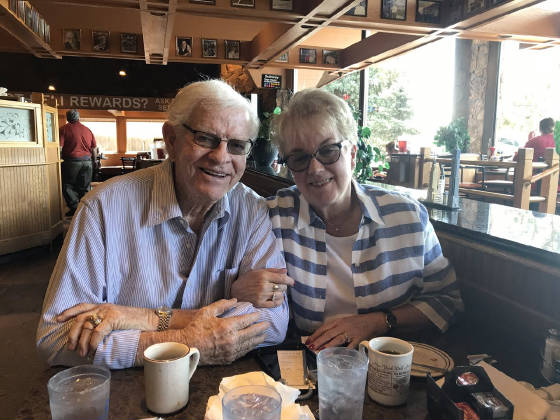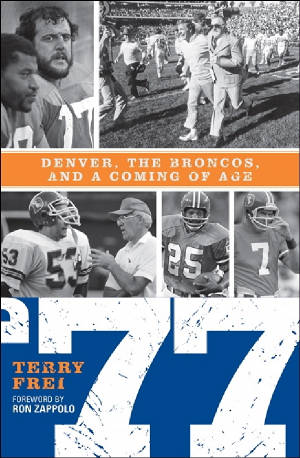The following is an adapted excerpt from
'77, discussing the background of the Raiders-Broncos rivalry when Red Miller took over as head coach for, and taking readers
through the landmark Oct. 30, 1977 meeting between the teams ... in Oakland.
In meetings and the brief off-season camps, Red Miller hammered
home his philosophy, and many of the players came away thinking this was a guy who would both pat on the back and praise,
but also offer to take off the whistle, shed his role as coach, and settle it man-to-man. With disdain, he banished one sign
of that togetherness of the Ralston era that had been brought to the Broncos by linebacker Ray May. Looking back, Miller laughs
about using an epithet in getting it across. “I told ’em, ‘If you hold hands with anybody in the huddle,
you’re out of this place and on your way, do you understand that?”
Actually, that was fine with the Broncos.
“And in one of the first meetings,” he adds, “I told them,
‘You guys got a pretty good squad here, but you’re missing something and I’ll tell you what it is. You got
beat by the Oakland Raiders, that’s what you’re missing! I’m telling you now, you’re going to beat
the Oakland Raiders! I’ve beaten them more than they’ve ever beaten me with any team I’ve been with, and
I know how to beat them!” ”
Years
later, cornerback Louis Wright remembers the speech vividly.
“It’s the very first meeting and he had an attitude!” Wright says, laughing. “I
mean, the first thing I was thinking was, ‘Wait a minute, wait a minute! You’re supposed to be on our side.’
He was saying, ‘You guys, I’m gonna tell ya” . . . I mean, I’m thinking, ‘Give us a chance to
screw up in practice and then chew our butts or something. You haven’t even seen us play or practice!’ But after
he kind of calmed down, he was saying, ‘Hey, there isn’t any secret here. We’re going to have to whup (them).”
Wright remembers Miller repeatedly driving his right
fist into his left open palm, punctuating his points.
Whap!
“Number one,
you gotta beat the Raiders . . .”
Whap!
“Whup their . . .”
Whap!
“No fancy stuff . . .”
Whap!
“The
New England Patriots are a hard-nosed football team, and that’s what we want to be . . .”
Whap!
“I don’t care what plays we draw up, what kind of meals you eat, if you don’t
whup that guy across from you, we just can’t win!”
Whap!
Wright’s
fellow starting cornerback, Steve Foley, remembers the Miller speech along these lines: “So you guys haven’t been
able to beat the Raiders. Oh, every now and then.” Suddenly, Miller was yelling. “Let me tell you where I’m
coming from! I’m coming from the New England Patriots and we kicked their . . . We’re gonna knock (them) in the
dirt! . . . I don’t care if you have to get in fights with them or whatever.”
Foley says Miller “was dead serious. We took on an edge
to our team that brought out an incredible confidence that we had that was waiting there, waiting to come out.”
Billy Thompson laughs as he says his initial impression
of Miller was as “a wild man. Very, very emotional. And he hated the Raiders.”
The Broncos had gone 2-7-1 against the Raiders under Ralston,
and had lost four in a row in the series when he was fired. In the Broncos” history, they were 6-26-2 against Oakland.
That was obscene.
(Several months later, both teams were 4-0 heading into their first meeting of the season,
on Oct. 30 at Oakland.)
On Monday, the Broncos gathered for their usual team
meeting in the racquetball court at the team headquarters. The weekly protocol was that Red Miller would make a brief speech
about the week and opponent ahead, and then the team would break into positional meetings.
Center Mike Montler, among others, vividly remembers this one
as being different. “Generally, the chairs were set up so they were facing the front and there was a podium there,”
Montler says. “This time the seats were turned facing the side wall and there was a platform that had the projector
on it. There was a reel of film and there couldn’t have been that much film on the reel.”
With two fingertips squeezed together, Montler shows how thin
the film was on the reel.
“Red comes
in with the entourage of assistant coaches and works his way up to where the projector was, and the rest of the guys lean
against the wall. Red really never said anything. There’s stunned silence and we’re thinking, What’s going
on here? Who died? This is different.”
Miller
looked over at the assistant coaches and said, sharply, “Lights.”
The room went pitch black.
Miller turned on the projector and rolled the film.
It was maybe 30 plays, at the most.
He stopped some of the plays with the coach’s “clicker,” reversed
the
film, then showed them again. The sequence
of plays were illegal hits, cheap shots, dirty play _ all collected from games Miller had coached against the Raiders over
a span of about eight years, most of them when he was with the Patriots. One of the clips showed Raiders linebacker Phil Villapiano’s
forearm to the face of Patriots tight end Russ Francis in the 1976 playoff game, which left Francis with a broken nose.
Miller hadn’t said a word.
Finally, he was through.
“Lights!” he barked.
The lights came on.
Starting slowly, Miller said, “I want to tell you what I like about the Oakland Raiders.”
He began picking up steam. “I don’t like a thing about them!” Now, he was snarling and spitting it out.
“I don’t like their colors. I don’t like their stadium. I don’t like their fans. I don’t like
a thing about them.”
He paused.
“Now, go to your meetings,” he said, and
walked out of the room.
Montler laughs.
“Right at that point,” he says, “we could have gotten on a Greyhound with our own money and gone out and
kicked (them). I think we probably were higher then than we were for the game.”
Asked about the scene, Miller says he wanted “to get my team to know that,
hey, when you play the Oakland Raiders, you have to beat them at their style. That doesn’t mean dirty hitting, but hitting
all day long, and 1, 2, 3, 4, 5, and as many as 11, if you can get them all in, on a tackle.”
* . * . *
A couple of hours before the game in Oakland, anxious linebacker
Bob Swenson decided to take a walk.
What
he came across astounded him.
Red
Miller, who had bitter memories of referee Ben Dreith’s crucial and perhaps history-changing roughing-the-passer penalty
against the Patriots in the playoff game against the Raiders in the same stadium the previous season, was confronting the
men in striped shirts.
“The Raiders
were this incredibly talented team and it really did seem like the referees gave them a lot of leeway,” Swenson says.
“They just got away with stuff. They had a couple of guys back there like (Jack) Tatum and George Atkinson who did some
things, and there was some holding, and it always seemed that the referees kind of looked the other way or just kind of had
the attitude of ‘they’re the champs.’
“So I come around the corner and there’s Red, he’s just lighting into, chewing out
the referees. He’s saying, ‘You guys call this game straight and if you don’t, I will be in your face!”
He’s dressing these guys down before the game! And I was like, ‘Wow!’ Red knew there was something at stake,
big time, and he wanted a fair, even field. That was classic Red right there. He knew something was up, something was special.”
Says Miller: “I was up for that game. Once in
a while, you have to get their attention, you know. I guess that was my way of doing it.”
The Broncos got everyone’s attention that day.
They beat the Raiders 30-7, largely because Ken Stabler
threw seven interceptions, three to Joe Rizzo.
Plus,
there was the bizarre-looking, backbreaking touchdown pass from holder Norris Weese to Jim Turner.
The Broncos were leading 14-7 late in the first half when they
lined up for what would have been a Turner 42-yard attempt on a fourth down from the Oakland 25. Weese, the scrambling backup
quarterback, admitted he had been “startled” by the call. It was the play they had practiced a couple of weeks
earlier _ a fake with tight end Riley Odoms as the first option, which was fairly conventional; but with Turner, the old man
in black high-tops, as the secondary receiver along the sideline.
“It was one of those trick things you put in your bag, and never would I have thought
they’d call it,” Turner says.
Weese
took the snap, rolled right, looked at Odoms, and then looked back to the left, where Turner was running along. Alone. The
pass hit Turner in stride at about the Raiders” 15 and he trotted into the end zone.
Within seconds, the Broncos” lead was 21-7.
The rout was on.
Although the myth was popularized that Turner was the primary receiver on the
play, he wasn’t. Odoms was.
Years
later, Billy Thompson smiles when he thinks about that play. “It took Jim Turner forever to get in the end zone,”
he says. “Ol” Hightops!”
Recalls
Turner: “They followed Riley Odoms, they followed Norris, they followed Randy Gradishar. They all went to our right.
I went to the left and thank God there was nobody near me. I had scored so many times in high school. I think I was the second-leading
scorer in the state of California my junior and senior year, so the scoring didn’t bother me. It was the catching and
running. . . God bless Norris, he threw it right on the money.” He laughs. “It was a big play and sometimes it
aggravates me that I kicked 304 field goals in my career and that’s all they want to talk about, that play.”
Tom Jackson, in addition to covering backs out of
the backfield and making tackles, devoted his energy to unleashing disdainful broadsides in the direction of the Oakland bench,
including coach John Madden. After recovering a fumble late in the game near the sideline, Jackson got up, waved the ball,
and spotted Madden a few feet away. “It’s all over, fat man!” he yelled.
On the NBC broadcast, sage play-by-play man Curt Gowdy, the voice
of American sports and ‘The American Sportsman,’ mused that Sunday “has to be the greatest day in the history
of the Denver franchise.”
Up
to that point, it was.
Years later, Miller
calls that game “the turning point of the whole year,” and says his postgame speech emphasized the clearing of
a mental hurdle.
“We beat
the Super Bowl winner in their house!” he recalls telling his team. “And now, gentlemen, if we can play like that
and hold together, we’re going to be fine.”

Red and Nan Miller shortly before his 2017 death.

